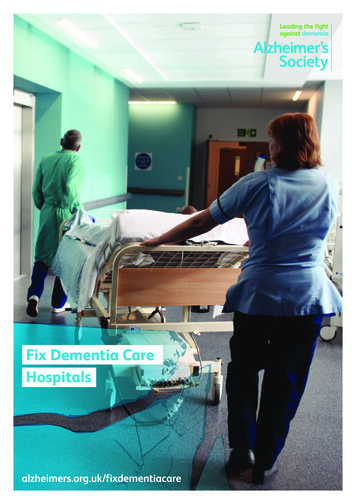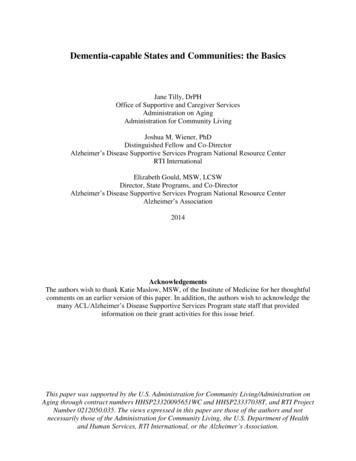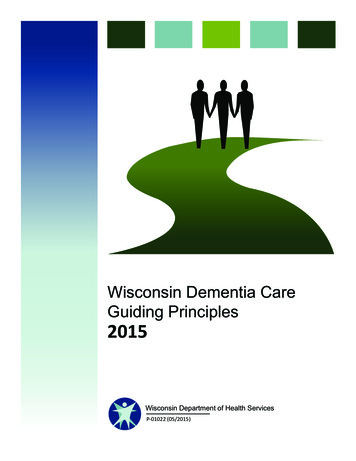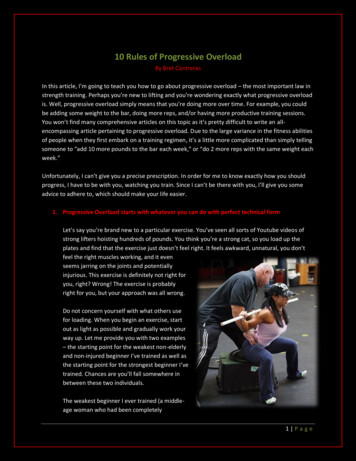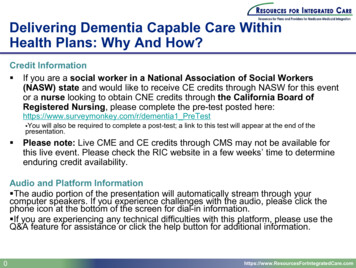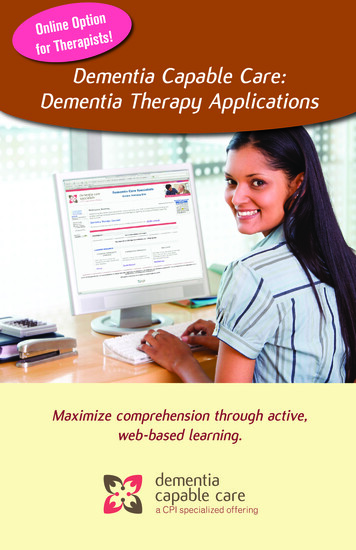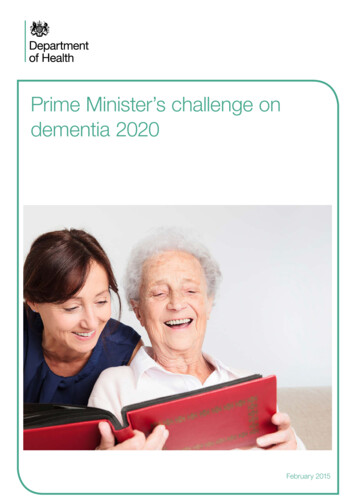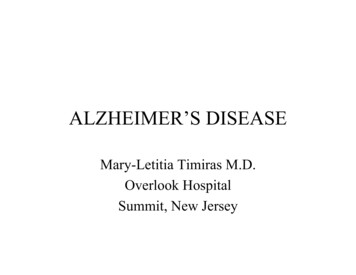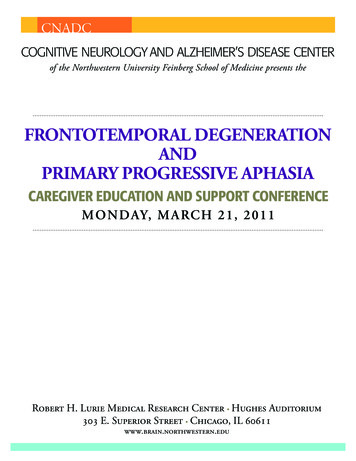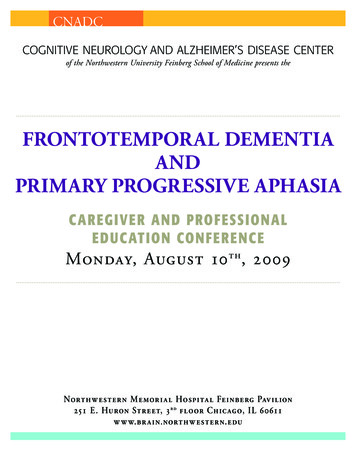
Transcription
CNADCCognitive Neurology And Alzheimer’s Disease Centerof the Northwestern University Feinberg School of Medicine presents theFrontotemporal DementiaAndPrimary Progressive AphasiaCaregive r an d ProfessionalE ducation con fe re nceMonday, August 10 th, 2009Northwestern Memorial Hospital Feinberg Pavilion251 E. Huron Street, 3 r d floor Chicago, IL 60611w w w.br ain.northwestern.edu
CNADCFRONTOTEMPORAL DEMENTIA (FTD)ANDPRIMARY PROGRESSIVE APHASIA (PPA)CAR EGIVER AND PROFE S SIONAL EDU CATION CONFER EN CEAUGUST 10TH, 2009AGENDA8:00 AMRegistration and Breakfast9:00 AMWelcomeM.-Marsel Mesulam, MD9:05 AMAssociation for Frontotemporal DementiasSharon Denny, MA9:15 AMCurrent FTD/PPA Research at the CNADCSandra Weintraub, PhD9:45 AMThe Road to Fearless CaregivingTiffany Chow, MD11:00 AMQuestion and Answer Session12:15 PMLunch1:30 PMCaregivers: Guided Support SessionsProfessionals: Person Centered Care for Persons withFTD and PPA3:00 PMFilm on Frontotemporal Dementia: PreviewKatie Moriarty3:10 PMThe Stories of Our LivesDan McAdams, PhD4:00 PMAdjourn
CNADC 2009 Northwestern University Cognitive Neurology and Alzheimer’s Disease Center, Chicago, IL www.brain.northwestern.edu2
CNADCTABLE OF CONTENTSPageContent5Program Highlights13About the CNADC15Disease Information17Current FTD/PPA Research at the CNADC18Dr. Chow Slides: “The Road to Fearless Caregiving”23Afternoon Sessions Handouts38The Importance of Brain Donation392009 Caregiver Resource List43Professional Resources 2009 Northwestern University Cognitive Neurology and Alzheimer’s Disease Center, Chicago, IL www.brain.northwestern.edu3
CNADCTHANK YOU!The Cognitive Neurology and Alzheimer’s Disease Center of the NorthwesternUniversity School of Medicine thanks the Association for FrontotemporalDementias for their generous support of this special event.We also thank the Alzheimer’s Association – Greater Illinois Chapter forgenerously providing social work continuing education credits.Finally, we would like to thank our special caregivers, Mary Beth Riedner andLorene Schlie for their part in this year’s planning committee.2009 Planning Committee Members:CNADC Faculty and StaffJoseph BoyleDerin CobiaJim MontiDarby MorhardtMary O’HaraEmily RogalskiFelecia StokesSandra WeintraubChristina WienekeMargaret ZoncaMary Beth Riedner – Family Caregiver (PPA)Lorene Schlie – Family Caregiver (FTD)Nicole Batsch, Alzheimer’s Association – Greater Illinois ChapterDebra Crystal, NorthShore University HealthSystemSharon Denny, Association for Frontotemporal DementiasSusan Dickinson, Association for Frontotemporal DementiasFaith Langtiw, NorthShore University HealthSystem 2009 Northwestern University Cognitive Neurology and Alzheimer’s Disease Center, Chicago, IL www.brain.northwestern.edu4
CNADCPROGRAM HIGHLIGHTSKeynote SpeakerTiffany Chow, MDRotman Research InstituteBaycrest Brain Health Centre Ross Memory ClinicUniversity of TorontoDr. Tiffany Chow is a Clinician-Scientist at the Rotman Research Institute, staff BehaviouralNeurologist at Baycrest's Brain Health Centre Ross Memory Clinic, and holds a dualappointment as Assistant Professor of Neurology and Geriatric Psychiatry with the University ofToronto. She earned her dual Bachelor’s of the Arts and Sciences in German Studies andBiology, and a Master’s degree in Marine Biology at Stanford before attending Rush MedicalCollege in Chicago. She completed Neurology residency training at University of California SanDiego, followed by a Fellowship in Dementia and Behavioral Neuroscience at University ofCalifornia Los Angeles. She went on to join the faculty at the UCLA School of Medicine, thenbecame Clinical Core Director at the University of Southern California Alzheimer’s ResearchCenter with a research program for frontotemporal dementia.Dr. Chow serves patients with early onset dementias in her Baycrest clinic. Her researchfocuses on behavioural disturbances brought on by dementia, as well as their apparentopposite, apathy, and how these symptoms relate to brain chemistry as seen with functionalneuroimaging. She has authored more than 25 peer-reviewed papers and 8 book chapters. Atan international level, she chairs the Education Committee for the Medical Advisory Committeeof the Association for Frontotemporal Dementias. Dr. Chow’s commitment to caregiver issues indementia motivates her active participation as a Board member of the Alzheimer’s Society ofToronto. She also serves on the Board and as the Head of the Medical Advisory Committee forDancing with Parkinson’s, a non-profit organization based in Toronto. 2009 Northwestern University Cognitive Neurology and Alzheimer’s Disease Center, Chicago, IL www.brain.northwestern.edu5
CNADCSandra Weintraub, PhDDr. Sandra Weintraub is Professor of Psychiatry and Neurology at Northwestern UniversityFeinberg School of Medicine and the Director of Neuropsychology in the Cognitive Neurologyand Alzheimer's Disease Center (CNADC). She has been the director of the Clinical Core of theNorthwestern CNADC funded by the NIA since 1996. Dr. Weintraub has been awardedindependent research grants from the National Institute on Aging and the Illinois Department ofPublic Health. She has authored over 130 articles and book chapters on the neuropsychologyof dementia and aging, aphasia and hemispatial neglect and is currently working on a project tounderstand word retrieval and grammatical processing failures in patients with PrimaryProgressive Aphasia.Dr. Weintraub is a native of Montreal, Canada and received her bachelor’s degree from McGillUniversity. She received her PhD in Psychology from Boston University in 1978. In 1977 shestarted the Clinical Neuropsychology program in Behavioral Neurology at the Beth IsraelHospital in Boston. She was Associate Professor of Neurology at Harvard Medical School until1994 when she joined the faculty of Northwestern University where she is also the director ofthe graduate Clinical Neuropsychology track in the Division of Psychology at the FeinbergSchool of Medicine. She is board certified in Clinical Neuropsychology by the American Boardof Professional Psychology and directs the outpatient clinical neuropsychology service at theNeurobehavior Service, Northwestern Medical Faculty Foundation, a multidisciplinary clinicdedicated to state-of-the-art diagnostic, treatment and research resources for patients andfamilies.Dr. Weintraub was one of the two Scientific Honorees recognized at the Rita Hayworth Gala ofthe National Alzheimer’s Association in 1997 and has served twice as a member on the board ofdirectors of the Greater Illinois Chapter of the Alzheimer’s Association. She is frequently invitedto consult on matters related to Alzheimer’s disease epidemiology, diagnostic criteria and publichealth issues. 2009 Northwestern University Cognitive Neurology and Alzheimer’s Disease Center, Chicago, IL www.brain.northwestern.edu6
CNADCDan McAdams, PhDDan P. McAdams is Professor of Psychology and Professor of Human Development and SocialPolicy at Northwestern University, Evanston, IL. Professor McAdams received his B.S. degreefrom Valparaiso University in 1976 and his Ph.D. in Psychology and Social Relations fromHarvard University in 1979. Honored as a Charles Deering McCormick Professor of TeachingExcellence at Northwestern, Professor McAdams teaches courses in Personality Psychology,Adult Development and Aging, Theories of Personality and Development, and the Literatures ofIdentity and Generativity.Author of over 150 articles and chapters and author or editor of 14 books, Professor McAdamsworks in the areas of personality and life-span developmental psychology. Most recently,Professor McAdams is the author of The Redemptive Self: Stories Americans Live By (OxfordUniversity Press, 2006). The Redemptive Self charts a new psychology of American identity asexpressed in cultural and historical American texts and images and in the life stories of caringand productive American adults in their midlife years. The book won the 2006 William JamesAward from the American Psychological Association for best general-interest book inpsychology, across all subfields. It also earned the 2006 Theodore Sarbin Award from theAmerican Psychological Association for its contribution to theoretical and philosophicalpsychology.Professor McAdams is also the 1989 winner of the Henry A. Murray Award from the AmericanPsychological Association, for his work on personality and the study of lives. With RuthellenJosselson and Amia Lieblich, he is co-editor of the book series, The Narrative Study of Lives(APA Press). His work has been featured in many national publications and media outletsincluding the New York Times, Wall Street Journal, USA Today, Newsweek, Psychology Today,Self magazine, and Good Morning America. 2009 Northwestern University Cognitive Neurology and Alzheimer’s Disease Center, Chicago, IL www.brain.northwestern.edu7
CNADCPROGRAM HIGHLIGHTSAfternoon Guided Support Sessions for CaregiversNewly Diagnosed: What Now?After a diagnosis is made, families face a tremendous unknown. We will discuss the feelingsand realities that set in after a diagnosis is made, the decision to tell others, putting together acare team and the information necessary to begin legal and financial planning in the future.Changes in BehaviorA common symptom of FTD and later in PPA is a change in personality and emotion. Behaviorscan include apathy, loss of inhibition and empathy, ritualistic and compulsive behaviors,impaired judgment and loss of insight into personal conduct. These behaviors can beemotionally and physically exhausting to manage. We will explore the effect these behaviorshave on family relationships. We will also discuss different types of meaningful activities thatfamilies can introduce to the person, as their needs change over time.Communication Tools in PPAAs the disease progresses, many individuals with PPA lose the ability to speak and other areasof cognition are affected. By learning how to use alternative methods of communication,families can help a person remain engaged. In this session, we will share experiences andexplore alternative forms of communication. We will also discuss non-verbal forms ofcommunication and expression that can enhance a person’s involvement in their relationships.When Do I Start to Take Over?This question is one that many family members face. It is not always obvious when a personneeds more supervision or assistance, and it is easier said than done. We will shareexperiences as we discuss ways to introduce a change in care and ways to balance safety withallowing a person to feel in control. We will also explore how to help the person with FTD/PPAand the family adjust to changes in care or restrictions to their independence.Thinking About the FutureThis group will explore the options for a loved one’s future care. We will review care optionsavailable to the person and family as the person’s needs change. We will also discuss theimportance of educating care staff about FTD/PPA if they are unfamiliar with the diagnosis. Wewill learn about end of life care options that promote comfort and dignity at end of life. 2009 Northwestern University Cognitive Neurology and Alzheimer’s Disease Center, Chicago, IL www.brain.northwestern.edu8
CNADCPROGRAM HIGHLIGHTSAfternoon Guided Support Sessions for CaregiversGroup FacilitatorsDerin Cobia, PhD is a postdoctoral fellow in the Department of Psychiatry and Behavioral sciences atthe Northwestern University Feinberg School of Medicine. He earned his degree in clinical psychology,specializing in neuropsychology.Debi Crystal, LCSW is the social worker and Coordinator of Community Education at the Alzheimer’sand Memory Assessment Center at NorthShore University HealthSystem. She provides support to theCenter’s patients and their families. Debi is a licensed clinical social worker and has worked as a socialworker with older adults both in the community and in facilities for over twenty years.Sharon S. Denny, MA is the program director at the Association for Frontotemporal Dementias whereshe directs the caregiver support and education initiatives. She has a Masters degree in ClinicalPsychology and more than twenty-five years experience with nonprofit organizations serving people withmedical and psychiatric disabilities and their families.Amy and Eileen Duhig are daughters of Marty, who was diagnosed with FTD in March 2005. They areboth employed full time and go home to provide their mother respite on a weekly basis.Rebecca Gavett, MA is a doctoral student in clinical neuropsychology at the CNADC. She received herBA from University of Rochester and her MA from University at Buffalo in behavioral neuroscience.Rebecca currently is researching predictors of successful aging.Robert Hurley, MA is a doctoral candidate in Neuroscience at the CNADC. He has his BA fromUniversity of North Carolina at Greensboro and MA in experimental psychology from Wake ForestUniversity.Mary O’Hara, MA, LSW is a social worker and education and outreach specialist at Northwestern’sCognitive Neurology and Alzheimer’s Disease Center (CNADC). In addition to helping to facilitate theCNADC’s Quality of Life Enrichment programs, Mary also provides education and support to diagnosedpersons and their families.Diana Kerwin, MD is Assistant Professor of Medicine, Division of Geriatrics, Northwestern UniversityFeinberg School of Medicine. She recently returned to Northwestern from the Medical College ofWisconsin, Milwaukee where she directed a Memory Disorders Clinic and was Assistant Professor ofMedicine, Division of Geriatric.Dr. Kerwin will begin seeing patients and families in the CNADC’sNeurobehavior and Memory Health Clinic in September 2009, in addition to conducting dementiaresearch on the effects of body weight as a risk factor for dementia. 2009 Northwestern University Cognitive Neurology and Alzheimer’s Disease Center, Chicago, IL www.brain.northwestern.edu9
CNADCCaregiver Group Facilitators, continuedDaniel Kuhn, MSW is the Director of the Professional Training Institute for the Alzheimer’s Association Greater Illinois Chapter, based in Chicago. He completed a master’s degree in social work at theUniversity of Illinois in Chicago and is a licensed clinical social worker. He has authored or co-authoredmore than 50 publications on dementia care including his most recent book, The Art of Dementia Care.He is the 2009 recipient of the Mental Health and Aging Award by the American Society on Aging.Julia Rao joined the CNADC in September 2008 as a graduate student in Northwestern's ClinicalNeuropsychology program and works in the lab of Dr. Sandra Weintraub. She is a graduate ofpsychology from the University of Wisconsin-Madison and is now working on the project researchingPrimary Progressive Aphasia.Mary Beth Riedner and her husband Steve have been married for 36 years. Steve was diagnosed withPrimary Progressive Aphasia in the fall of 2006. They have three grown children and two adorablegrand-daughters. Mary Beth retired a year ago from Roosevelt University where she served asUniversity Librarian for nine years.Emily Rogalski, PhD is an Assistant Research Professor at the CNADC. Dr. Rogalski is a neuroscientistwhose research focuses on using structural neuroimaging as a tool to understand the consequences ofaging and dementia.Lorene Schlie is a mother and grandmother, married 41 years to Ron, who was diagnosed with FTDMarch 2006. She is employed full time and is Ron’s advocate and caregiver. In March 2008, she startedan FTD support group with eight people that has grown to fifteen plus caregivers and now includes otherdementias.Christina Wieneke joined the CNADC almost three years ago and is the project coordinator for theLanguage in PPA research study at the CNADC. She received her Bachelor’s degree in BehavioralNeuroscience from Purdue University in 2006.Sandra Weintraub, PhD is Professor of Psychiatry and Neurology at Northwestern University FeinbergSchool of Medicine and the Director of Neuropsychology in the CNADC. Her research focuses on theneuropsychology of dementia and aging. 2009 Northwestern University Cognitive Neurology and Alzheimer’s Disease Center, Chicago, IL www.brain.northwestern.edu10
PROGRAM HIGHLIGHTSAfternoon Panel for Professionals“Person Centered Care for Persons with FTD and PPA”FacilitatorDarby Morhardt, MSW, LCSW is Research Associate Professor and Director of Education for theCognitive Neurology and Alzheimer’s Disease Center (CNADC) at Northwestern University FeinbergSchool of Medicine. Ms. Morhardt holds a master’s degree in social work from Jane Addams College ofSocial Work and has completed postgraduate work in family therapy at the University of Illinois atChicago. She has 25 years of clinical experience with cognitively impaired individuals and their families.This work led to the development of support, education and social programs for persons in early stagedementia including the Northwestern University Buddy Program , pairing first year medical studentswith persons with Alzheimer’s disease. In addition to studying the effectiveness of these programs, otherareas of research are the experience and needs of persons and families with primary progressiveaphasia (PPA) and frontotemporal dementia (FTD). Ms. Morhardt is also responsible for organizing theCNADC’s community education and outreach programs throughout Chicago and has worked to buildAlzheimer’s awareness in limited English proficiency communities.Panel MembersJoan and Theresa Brzezinski are the wife and daughter of Tom Brzezinski who was diagnosed withFTD at the age of 54. They cared for Tom for 5 years until his very recent death on July 27, 2009.While Tom was able to live at home for the first 3-4 years after diagnosis, Joan and Theresa eventuallyhad to seek long term care when they were no longer able to manage Tom’s increasingly difficultsymptoms and behavior. This afternoon, they will share the experience they had with long-term careservice providers as they attempted to find the best care for Tom. They will describe what worked, andwhat didn’t, the effects on their lives, and what they believe all dementia care providers can learn fromtheir experience.Stuart Gaines, CPA, MBA, has spent the past 25 years helping organizations provide cost effectiveprogramming for persons with health challenges. He was one of the lead designers of the Illinois assistedliving industry and authored the standards of dementia care incorporated into Illinois statutes. He haspromoted home and community-based services and the use of Medicaid waivers to finance home carefor the families of persons with dementia. Mr. Gaines is also recognized for his expertise in all facets ofdementia programming and his ability to work with professional staff to provide person-centered care forthose with a dementia. Mr. Gaines currently sits on the board of directors of the Alzheimer’s Associationof Greater Illinois and is chair of the board of directors for the Alzheimer’s Association of Central andNorth Florida. He also is a board member of Seguin Services, an organization serving the disabilitycommunity. He has also shaped the direction of long-term care in both Illinois and Wisconsin. In 1989,Mr. Gaines co-founded Wisconsin-based ElderHaus Concepts, Ltd. and grew the business to nationalprominence. ElderHaus employed a variety of innovative approaches to dementia care, allowing personswith dementia to remain in their communities. At the time of its sale in 1997, ElderHaus had grown to 29dementia-specific facilities and was one of the largest providers of dementia services in the nation. 2009 Northwestern University Cognitive Neurology and Alzheimer’s Disease Center, Chicago, IL www.brain.northwestern.edu11
CNADCProfessional Panel Members, continuedBernice (Bernie) Marinelli, RN/BSN, brings 20 years of dementia and behavioral industry experience asan educator, clinician and administrator. Ms. Marinelli is the founder and CEO of Anam Care, Inc., aresidential care organization, specializing in behavioral programming and late stage dementia care.Prior to founding Anam Care, she was hospice supervisor for OSF, Inc. and later the director of dementiaservices for Highview Corporation. In the mid-1990s, Ms. Marinelli created one of the first late-stagepalliative care dementia programs in the state. She is chair of the Northern Illinois Palliative CareConsortium, a certified holistic Reiki practitioner and a frequent speaker at long-term care conferences.Ms Marinelli has served the Rockford community in the field of “Community Health Nursing” andHospice, developing Rockford’s first twenty-four hour on-call service to families in need of immediatecare in the home. She has been certified in pain management and hospice care since 1988. Over thepast fifteen years, Ms Marinelli has been dedicated to developing community-based case managementand home care services for the treatment of Alzheimer’s disease, FTD (frontal lobe dementia) andbehavioral health programming.Jane Stansell, RN, MSN is the Director of the Alzheimer’s Family Care Center in Chicago. Experiencehas convinced her that with a supportive environment, people with dementia can use their retained skillsand abilities throughout the illness to maintain a sense of well-being. She has been a strong advocatefor change in the way care is provided to include both emotional and functional support to compensatefor losses associated with the illness. She has worked with other adult day service providers at the stateand national level, as well as; regulatory bodies to promote care for appropriate to the needs and abilitiesof people with dementia.Mary Weaver, RN is Nurse Coordinator for the House of Welcome Adult Day Services, North ShoreSenior Center in Northfield, Illinois where she has worked for over 20 years. She received her diplomain nursing from St. Joseph Hospital School of Nursing and a certificate in gerontology in 2002. In her roleat the House of Welcome, Ms. Weaver coordinates and provides nursing services, in addition to day-today program management. Her many duties include the planning and implementation of daily activities,communication with family caregivers on issues relating to participants’ needs. She also conducts theorientation, training and supervision of HOW staff, students and volunteers. 2009 Northwestern University Cognitive Neurology and Alzheimer’s Disease Center, Chicago, IL www.brain.northwestern.edu12
CNADCWHO WE ARECognitive Neurology and Alzheimer’s Disease CenterNorthwestern University Feinberg School of MedicineMission:The Cognitive Neurology and Alzheimer’s Disease Center (CNADC) is a multidisciplinaryorganization dedicated to the following pursuits:1. Conducting research to discover how the brain coordinates cognitivefunctions such as memory, language, attention, and emotion.2. Discovering causes and treatments for diseases that disrupt these functions,such as Alzheimer’s disease, frontotemporal dementia and primaryprogressive aphasia.3. Transferring the benefits of this research to patients and their families.4. Training researchers and clinicians who want to work in this field.Research Areas: Human Cognitive Brain Mapping Treatment and Prevention of Alzheimer’s Disease Experimental Treatments Causes and Treatments of Primary ProgressiveAphasia, Frontal Dementia and other Early OnsetDementia Chemistry of Memory Maintenance of Cognitive Functionsin Aging Nature of Cognitive and Behavioral Changes inAlzheimer’s Disease Genetics320 East Superior Street, Searle 11th Floor, Chicago, IL 60611Phone: 312-908-9023, Fax: 312-908-8789, hwestern.edu 2009 Northwestern University Cognitive Neurology and Alzheimer’s Disease Center, Chicago, IL www.brain.northwestern.edu13
CNADCNEUROBEHAVIOR AND MEMORY HEALTH CLINICNORTHWESTERN MEDICAL FACULTY FOUNDATIONCare for Patients and Families:The Neurobehavior & Memory Health Clinic is designed to meet the needs of personsexperiencing memory loss or other symptoms of dementia, and their families.Services Include: Evaluation and follow-up care by behavioral neurologists who specialize in the diagnosisand treatment of dementia syndromes. Evaluation of memory and other thinking abilities with the use of specialized tests givenby a clinical neuropsychologist. Management of medication for memory disorders. The opportunity to participate in clinical research and clinical drug trials. Psychiatric evaluation and treatment for mood and behavior disorders associated withneurological disease. Education and counseling for patients and families. Information and referral to other supported services.A Dedicated Clinical TeamBehavioral NeurologistsM.-Marsel Mesulam, MD, DirectorDarren R. Gitelman, MDJay Gottfried, MD, PhDJaime Grutzendler, MDChuang-Kuo Wu, MD, PhDG. Peter Gliebus, MDNeuropsychologistsBeth Borosh, PhDNancy Johnson, PhD, ABPP-CNSandra Weintraub, PhD, ABPP-CNGeriatricianDiana Kerwin, MDClinic ManagerJill VerhagenNeuropsychiatristDeborah Reed, MDPatient Access RepresentativeAnthony NowaskeSocial WorkersDarby Morhardt, MSW, LCSWMary O’Hara, MA, LSW675 North St. Clair Street, Galter 20-100, Chicago, IL 60611Phone: 312-695-9627, Fax: 312-695-6072, http://www.brain.northwestern.edu 2009 Northwestern University Cognitive Neurology and Alzheimer’s Disease Center, Chicago, IL www.brain.northwestern.edu14
CNADCFRONTOTEMPORAL DEMENTIA (FTD)ANDPRIMARY PROGRESSIVE APHASIA (PPA)WHAT IS FTD AND PPA? FTD and PPA are types of dementia caused by “neurodegenerative”changes in the brain. Early symptoms of FTD include trouble regulating behavior, changes in personalityand/or typical emotional responses, and reduced self-awareness. Early symptoms of PPA are milddifficulties speaking normally, thinking of common words, and/or understanding what others are saying.WHAT DOES DEMENTIA MEAN? Dementia is a condition in which brain cells slowly and progressivelydie. This process is called “neurodegeneration.” It causes a decline in cognitive abilities to the point thatan individual is no longer able to maintain independence in daily living activities. Dementia is caused byabnormal proteins in brain tissue for reasons that are not well known. The abnormalities settle indifferent brain regions, determining exactly what symptoms an individual will have.HOW ARE FTD AND PPA DIFFERENT FROM ALZHEIMER’S DISEASE (AD)? AD is the mostfrequent kind of dementia. Short-term memory loss is the main symptom. In FTD, the main symptom ischanges in behavior because the brain abnormality initially affects the frontal areas of the brain, whichare involved in planning, organizing and successfully completing activities, and not the memory areas.Brain cell abnormalities in FTD are almost always of the Frontotemporal Lobar Degeneration (FTLD)type. In PPA, the main symptom is aphasia (loss of words) because brain abnormality initially affects thelanguage areas in the brain. Brain cell abnormalities of PPA are similar to AD in only 30% of cases. Inall other cases, FTLD is found.FEATURES OF FTD: Changes in behavior and personality are progressive, creating difficulties withinterpersonal interactions and self-awareness. Other noticeable symptoms may include: Reduced personal hygiene Distractibility Repetitive behavior Decreased frustration tolerance or impulsivity Changes in emotional expression and recognitionFEATURES OF PPA: Language impairment is progressive, creating difficulties with speech, writing,spelling and reading. Sometimes finding words is the only difficulty, other times grammar is impaired.Other noticeable symptoms may include: Slowed or halting speech Substitutions of words (“table” instead of “chair”) or words that are incomprehensible Difficulty understanding conversation despite normal hearing Inability to think of names, even though they can recognize you.WHAT HAPPENS WITH TIME? FTD and PPA are progressive. In time, the disease spreads into otherbrain areas and the individual begins to develop other cognitive symptoms. In FTD, the most commoncognitive change is difficulty with language while in PPA the most common change is personalitychange. Individuals with either disease can also develop memory loss, a decline in visual skills, troublemaintaining attention and difficulty making decisions.HOW CAN YOU HELP PERSONS WITH FTD/PPA AND THEIR FAMILIES? Be aware that theseindividuals may not respond in the same way as they used to, which is a result of the disease and notbecause they are not interested in what you are saying. Give them more time to process the informationand to express themselves. Talk in simplified sentences and break questions down to Yes/No questions.Encourage them to stay active both mentally and physically. Family caregivers need special attention aswell. They may need to adjust to new responsibilities, which is difficult and tiring. Your compassion andsupport is what they need most! 2009 Northwestern University Cognitive Neurology and Alzheimer’s Disease Center, Chicago, IL www.brain.northwestern.edu15
CNADCClinical Recommendations for Families and Individuals Diagnosed withPrimary Progressive Aphasia and Frontotemporal DementiaJennifer Medina, BS, Sara Banks, BSc, and Sandra Weintraub, PhDPPA is an atypical dementia that causes progressive breakdown of language, and such the needs ofindividuals with diagnosis are unique. FTD is a related disorder that causes a progressive breakdown inbehavior. The two disorders often overlap, with PPA patients eventually showing behavioral change andFTD patients showing language symptoms. Here are some suggestions to help FTD and PPA patientsand their families improve quality of life:1. Avoiding Depression. Depression is quite common in PPA, where the patient is usually unawareof their language problem. The family and physician should watch for signs of depression, whichinclude tear
2009 Northwestern University Cognitive Neurology and Alzheimer's Disease Center, Chicago, IL www.brain.northwestern.edu 6 CNADC Sandra Weintraub, PhD Dr. Sandra Weintraub is Professor of Psychiatry and Neurology at Northwestern University Feinberg School of Medicine and the Director of Neuropsychology in the Cognitive Neurology
